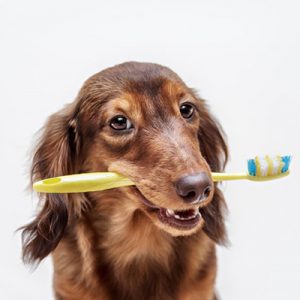
At our veterinary practice, we understand the importance of maintaining your pet’s dental health. Our dedicated St. Augustine vet team is committed to providing comprehensive dental care to keep your pet’s mouth happy and healthy.
Cat and Dog Dental Care in St. Augustine, FL
Dental disease is one of the most common health problems in pets, affecting over 80% of dogs and 70% of cats over the age of three. It is caused by a buildup of plaque and tartar on the teeth, which can lead to gum disease, tooth decay, and even tooth loss. If left untreated, dental disease can also affect other organs in the body, such as the heart, liver, and kidneys.
Regular dental care for pets is essential to prevent dental disease and maintain their overall health.
Signs of Dental Disease in Cats and Dogs
- Bad breath
- Yellow or brown buildup on teeth
- Red, swollen, or bleeding gums
- Difficulty eating or chewing
- Pawing at the mouth
- Loose or missing teeth
- Excessive drooling
- Changes in behavior, such as irritability or depression
If you notice any of these signs in your pet, it is important to schedule a dental examination.
Cat and Dog Dental Cleanings in St. Augustine, FL
During a dental examination, our veterinarians will check your pet’s teeth and gums for signs of disease.
If your pet is found to have dental disease, a dental cleaning may be recommended. This process involves removing plaque and tartar from the teeth, both above and below the gum line. Your pet will be placed under anesthesia for their safety and comfort during the procedure.
If your pet has severely damaged or infected teeth our skilled St. Augustine veterinarians may recommend extraction. Extraction of severely damaged or infected teeth is a necessary step to alleviate pain, prevent further oral health complications, and improve your pet’s overall quality of life.
Why Anesthesia is Necessary for Cat and Dog Dental Cleanings
Anesthesia provides a pain-free experience for your pet and allows our veterinary team to perform a comprehensive cleaning, which includes:
- Safety for your pet and our veterinary team – First and foremost, anesthesia ensures the safety of both your pet and our veterinary team. Animals, when in pain or discomfort, can react unpredictably. Anesthesia immobilizes your pet to prevent any sudden movements that could cause injury.
- Pain management – Dental cleanings can be uncomfortable. Imagine someone scaling under your gums without anesthetic – it wouldn’t be pleasant! Anesthesia ensures that your pet is pain-free throughout the procedure.
- Thorough cleaning below the gumline – Most dental diseases are found below the gumline. Without anesthesia, it’s nearly impossible to effectively clean this area, leaving behind bacteria that can lead to serious health issues.
- Full evaluation – Anesthesia allows veterinarians to complete a thorough examination of your pet’s mouth. This is crucial for identifying problems that are harder to identify when a pet is awake.
The Anesthetic Process in Cat and Dog Dental Cleanings
Understanding the anesthetic process can help pet owners feel more comfortable with the procedure. Let’s break it down.
- Pre-anesthetic evaluation – Before anesthesia, your pet will undergo a thorough examination. This may include bloodwork to ensure your pet is healthy enough for the procedure.
- Monitoring and support – Throughout the dental cleaning, your pet’s vital signs are closely monitored by our experienced veterinary team. Modern anesthetic machines and monitoring equipment help ensure your pet’s safety.
- Recovery – After the procedure, pets are carefully monitored as they wake up from anesthesia. Our veterinary team ensures that they are comfortable and safe during this process.
At-Home Pet Dental Care
While regular dental cleanings are important, at-home dental care is also crucial in preventing dental disease in pets. Here are some tips for maintaining your pet’s dental health at home:
- Brushing Your Pet’s Teeth – Pets can benefit from regular brushing. We recommend brushing your pet’s teeth at least 2-3 times a week. Use a pet-specific toothbrush and toothpaste, as human toothpaste can be harmful to pets. Start slowly and gradually increase the duration of brushing as your pet becomes more comfortable.
- Dental Chews and Toys – Dental chews and toys can help remove plaque and tartar from your pet’s teeth while also providing entertainment. Look for products that are specifically designed for dental health and avoid ones that are too hard, as they can cause tooth damage.
- Regular Check-Ups – In addition to regular dental cleanings, it is important to schedule regular check-ups with our veterinary team. They can monitor your pet’s dental health and catch any issues early on.
Find a St. Augustine, Florida Veterinary Dentist Near You
Finding a cat or dog dentist near you in St. Augustine is easy with our online direct booking feature. Both new and existing clients seeking care from a pet dentist may schedule an appointment at our St. Augustine veterinary clinic.

